南昌大学2013-2018复试真题
- 格式:pdf
- 大小:252.75 KB
- 文档页数:18
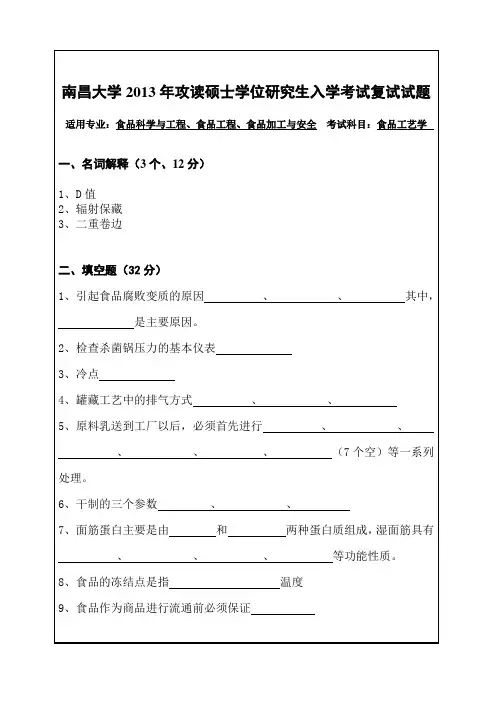
南昌大学2013年攻读硕士学位研究生入学考试复试试题适用专业:食品科学与工程、食品工程、食品加工与安全考试科目:食品工艺学
一、名词解释(3个、12分)
1、D值
2、辐射保藏
3、二重卷边
二、填空题(32分)
1、引起食品腐败变质的原因、、其中,
是主要原因。
2、检查杀菌锅压力的基本仪表
3、冷点
4、罐藏工艺中的排气方式、、
5、原料乳送到工厂以后,必须首先进行、、
、、、(7个空)等一系列处理。
6、干制的三个参数、、
7、面筋蛋白主要是由和两种蛋白质组成,湿面筋具有
、、、等功能性质。
8、食品的冻结点是指温度
9、食品作为商品进行流通前必须保证
10、冷链灌装温度是
11、常压杀菌法适用于性食品的杀菌,大多数蔬菜罐头的杀菌(能或不能)采用常压杀菌,但也有例外,如。
而高压杀菌方法主要适用于食品。
三、问答题(56分)
1、造成罐藏食品胀罐的可能因素有哪些?分别有什么影响?
2、影响腌制的因素包括那几大方面?
3、为什么食品冷冻一般采用快速冻结而不是采用缓冻?为什么?
4、在加工软饮料的过程中,什么时候可以直接采用自来水,为什么?
5、苏打饼干、酥性饼干、韧性饼干三种饼干分别采用下列哪种烘培温度和时间? A:220℃/4-6min B:300℃/3-5min C:250℃/5-6min
6、(20分)(1)牛奶巧克力的加工工艺流程(找出缺少的工艺步骤或者有错的工艺)(2)清水青豆罐头的加工工艺流程(找出缺少的工艺步骤或者有错的工艺)。
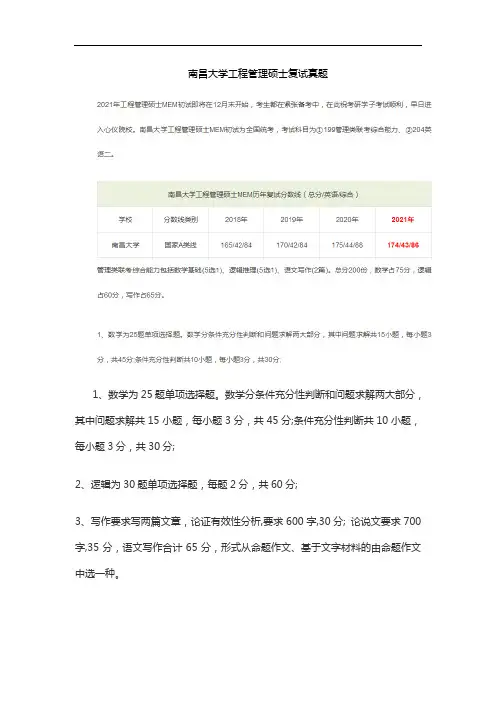
南昌大学工程管理硕士复试真题
1、数学为25题单项选择题。
数学分条件充分性判断和问题求解两大部分,其中问题求解共15小题,每小题3分,共45分;条件充分性判断共10小题,每小题3分,共30分;
2、逻辑为30题单项选择题,每题2分,共60分;
3、写作要求写两篇文章,论证有效性分析,要求600字,30分; 论说文要求700字,35分,语文写作合计65分,形式从命题作文、基于文字材料的由命题作文中选一种。
英语二包括完形填空(4选1)、阅读理解(4选1)、翻译(英译汉)、英文写作。
总分100分,难度介于四、六级之间,要求掌握大纲词汇5500个单词。
1、综合填空(完型填空)20道,每题0.5分,共10分;
2、阅读理解5篇文章,25题, 每题2分共50分;
3、翻译一题:英语翻译成中文,15分;
4、英语写作2题:小作文10分+大作文15分,合计25分。

南昌大学2013-2018复试真题
一、内科
【一】心内科
2018年南昌大学第一附属医院心内科复试真题
(一)名词解释
1.高血压急症
2.预激综合征
3.病态窦房结综合征(SSS)
4.缺血性心肌病
5.X综合征
(二)简答题(学硕选1,2,3,4,5;专硕选1,2,3,6,7)
1.急性冠脉综合征的病理生理学过程定义
2.慢性心衰的治疗原则
3.非瓣膜病房颤患者卒中风险CHA2DS2-VASC评分系统(房颤新指南内容)
4.舒张期隆隆样杂音可见于哪些疾病
5.心衰的Killip分级
6.急性ST段抬高性心肌梗死的PCI适应证
7.心脏再同步化治疗(CRT)的适应证
(三)心电图分析
1.患者,男,16岁,反复发作晕厥(阵发性室上速心电图)
2.患者,男,60岁,胸痛,CVP+4cmH20;BP:80/50mmHg(下壁心肌梗死心电图)
2018年南昌大学第二附属医院心内科复试真题
(一)名词解释
1.SAM现象
2.Beck三联症
3.法洛四联症
4.心力衰竭
5.心脏压塞
(二)简答题
1.ACS病理变化
2.继发性高血压常见病因
3.NYHA心衰分级
4.预激综合症心电图表现
5.心内科侵入性检查有哪些
6.洋地黄中毒临床表现及处理原则。
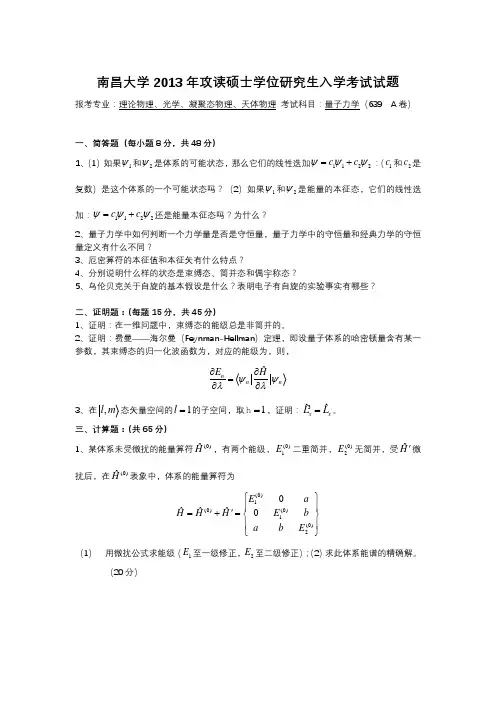
南昌大学2013年攻读硕士学位研究生入学考试试题报考专业:理论物理、光学、凝聚态物理、天体物理 考试科目:量子力学(639 A 卷)一、简答题(每小题8分,共48分)1、(1)如果1ψ和2ψ是体系的可能状态,那么它们的线性迭加1122c c ψψψ=+:(1c 和2c 是复数)是这个体系的一个可能状态吗?(2)如果1ψ和2ψ是能量的本征态,它们的线性迭加:1122c c ψψψ=+还是能量本征态吗?为什么?2、量子力学中如何判断一个力学量是否是守恒量,量子力学中的守恒量和经典力学的守恒量定义有什么不同?3、厄密算符的本征值和本征矢有什么特点?4、分别说明什么样的状态是束缚态、简并态和偶宇称态?5、乌伦贝克关于自旋的基本假设是什么?表明电子有自旋的实验事实有哪些?二、证明题:(每题15分,共45分)1、证明:在一维问题中,束缚态的能级总是非简并的。
2、证明:费曼——海尔曼(Feynman-Hellman )定理,即设量子体系的哈密顿量含有某一参数,其束缚态的归一化波函数为,对应的能级为,则,ˆn n n E Hψψλλ∂∂=∂∂ 3、在,l m 态矢量空间的1l =的子空间,取1=h ,证明:3ˆˆx xL L =。
三、计算题:(共65分)1、某体系未受微扰的能量算符(0)ˆH ,有两个能级,(0)1E 二重简并,(0)2E 无简并,受ˆH'微扰后,在(0)ˆH表象中,体系的能量算符为(0)1(0)(0)1(0)20ˆˆˆ0E a H H H E b a bE ⎧⎫⎪⎪'=+=⎨⎬⎪⎪⎩⎭(1) 用微扰公式求能级(1E 至一级修正,2E 至二级修正);(2)求此体系能谱的精确解。
(20分)2、(1)求一维无限深势阱0(x)00x U x a x a∞<=≤≤∞>中运动的粒子的本征值和相应的归一化本征矢;(2)设0t =时,此粒子的状态为:()2,0cos x x x a aππψ⎛⎫⎛⎫= ⎪ ⎪⎝⎭⎝⎭,求此时粒子的能量的可能值及相应的几率。
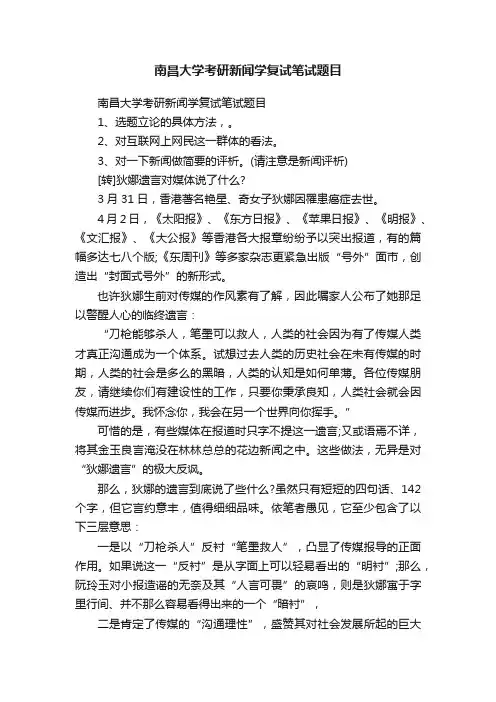
南昌大学考研新闻学复试笔试题目南昌大学考研新闻学复试笔试题目1、选题立论的具体方法,。
2、对互联网上网民这一群体的看法。
3、对一下新闻做简要的评析。
(请注意是新闻评析)[转]狄娜遗言对媒体说了什么?3月31日,香港著名艳星、奇女子狄娜因罹患癌症去世。
4月2日,《太阳报》、《东方日报》、《苹果日报》、《明报》、《文汇报》、《大公报》等香港各大报章纷纷予以突出报道,有的篇幅多达七八个版;《东周刊》等多家杂志更紧急出版“号外”面市,创造出“封面式号外”的新形式。
也许狄娜生前对传媒的作风素有了解,因此嘱家人公布了她那足以警醒人心的临终遗言:“刀枪能够杀人,笔墨可以救人,人类的社会因为有了传媒人类才真正沟通成为一个体系。
试想过去人类的历史社会在未有传媒的时期,人类的社会是多么的黑暗,人类的认知是如何单薄。
各位传媒朋友,请继续你们有建设性的工作,只要你秉承良知,人类社会就会因传媒而进步。
我怀念你,我会在另一个世界向你挥手。
”可惜的是,有些媒体在报道时只字不提这一遗言;又或语焉不详,将其金玉良言淹没在林林总总的花边新闻之中。
这些做法,无异是对“狄娜遗言”的极大反讽。
那么,狄娜的遗言到底说了些什么?虽然只有短短的四句话、142个字,但它言约意丰,值得细细品味。
依笔者愚见,它至少包含了以下三层意思:一是以“刀枪杀人”反衬“笔墨救人”,凸显了传媒报导的正面作用。
如果说这一“反衬”是从字面上可以轻易看出的“明衬”;那么,阮玲玉对小报造谣的无奈及其“人言可畏”的哀鸣,则是狄娜寓于字里行间、并不那么容易看得出来的一个“暗衬”,二是肯定了传媒的“沟通理性”,盛赞其对社会发展所起的巨大作用。
这些看似充满了赞誉之词的文字,实则只是下文的伏笔。
三是对传媒从业者发出真诚的呼唤,即希望他们秉持良知,肩负道德公义,以“建设性”而非破坏性的工作推动社会进步。
狄娜生前驰骋影坛、商界,被誉为“美貌智慧并重”,“绝非波大无脑之辈”。
同时,她也词锋犀利,嘴巴不肯饶人,曾当众拂了不少人的面子。
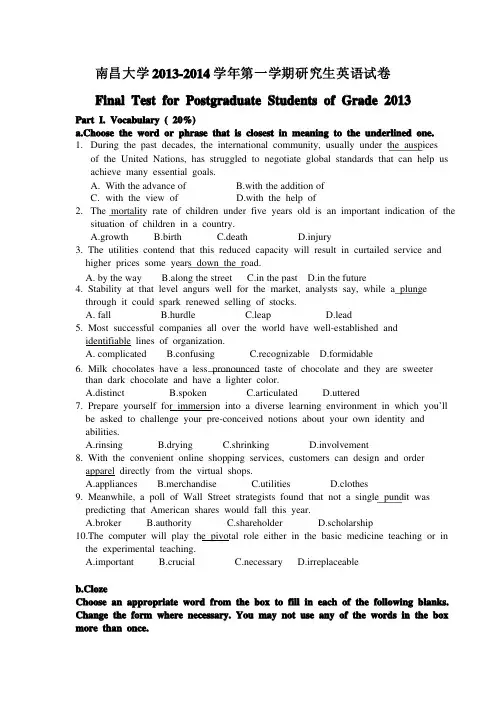
the auspices The mortalityyears down the road.a plungeidentifiableless pronouncedfor immersionapparelsingle punditthe pivotalquery aerial cognition expression attest robotics meld cover vital arise guideline deploy recapitulate endow collection In the journal Science, Professor Sharkey calls for ethical guidelines to (1)_______ all aspects of robotic technology, not just in the home and workplace, but also on the battelfield, where lethal robots such as the missile-armed Predator drones used in Iraq and Afghanistan are already (2) _______ with lethal effect. The US Future Combat Systems project aims to use robots as “force multipliers”, with a single soldier initiating large-scale ground and (3)_______ attacks by a robot droid army. “Robots for care and for war represent just two of many ethically problematic areas that will soon (4)________ from the rapid increase and spreading diversity of robotics applications, ” Professor Sharkey said, “Scientists and engineers working in robotics must be mindful of the potential dangers of their work, and public and international discussion is (5)_____ in order to set policy guidelines for ethical and safe application beford the guidelines set themselves.” The call for controls over robots goes back to the 1940s when the science-fiction author Isaac Asimov drew up his famous three laws of (6)_______. The first rule stated that robots must not harm people; the second that they must obey the commands of people provided they does not conflict with the first law; and the third law was that robots must attempt to avoid harming themselves provided this was not in conflict with the two other laws. Asimov wrote a (7)______ of science fiction sories called I, Robot which exploited the issue of machines and morality. He wanted to counter the long history of fictional accounts of dangerous automatons --- from the Jewish Golem to Mary Shelly’s Frankenstein --- and used his three laws as a literary device to exploit the ethical issues arising from the human interaction with non-human, intelligent beings. But late 20th –century prdictions about the rise of machines (8) ______ with superior artificial intelligence have not been realized, although robot scientists have given their mechanical proteges (门客准智能的) traits such as simple speech 门客) quasi-intelligent (准智能的recognition, emotional (9) ________ and face recognition. Professor Starkey believe that even dumb robots need to be controlled. “I’m not suggesting like Asimov to put ethical rules into robots, but to just to have (10)______ on how robots are used, ” he said. “Current robots are not bright enough even to be called stupid. If I even thought they would be superior in intelligence, I would not have these concerns. They are dumb machines not much brighter thatn the average washing machine, and that’s the problem.” Part II: Reading comprehension ( 20%) In this part, you will read four passages. You are required to choose the best answer to each question according to the passage and then mark your answer on the Answer Sheet by blacking the letter in the brackets. Passage OneArchaeology(考古学) is a source of history, not just a humble auxiliary discipline. Archaeological data are historical documents in their own right, not mere illustrations to written texts. Just as much as any other historian, an archaeologist studies and tries to reconstitute the process that has created the human world in which we live—and us ourselves in so far as we are each creatures of our age and social environment. Archaeological data are all changed in the material world resulting from human action or ,more succinctly, the fossilized results of human behavior. The sum total of these constitute what may be called the archaeological record. This record exhibits peculiarities and deficiencies the consequences of which produce a rather superficial contract between archaeological history and the more familiar kind based upon written records.Not all human behavior fossilizes. The words I utter and you hear as vibrations in the air are certainly human changes in the material world and may be of great historical significance. Yet they leave no sort of trace in the archaeological records unless they are captured by a Dictaphone or written down by a clerk. The movementof troops on the battlefield may “change the course of history,” but this is equally ephemeral from the archaeologist’s standpoint. What is perhaps worse, most organic material are perishable . Everything made of wood, hide, wool, linen, grass, hair, and similar materials will decay and vanish in dust in a few years or centuries, save under very exceptional conditions. In a relatively brief period the archaeological record is reduced to more scraps of stone, bone, glass, metal, and earthenware. Still modern archaeology, by applying appropriate techniques and comparative methods, aided by a few lucky finds from peat bogs deserts, and frozen soil is able to fill up a good deal of the gap.1.What is the author’s main purpose in the passage?A.To point out the importance of recent advances in archaeology.B.To describe an archaeologist’s education.C.To explain how archaeology is a source of history.D.To encourage more people to become archaeologists.2. The word “succinctly” in line 6 is closest in meaning to___A.concisely. B.briefly. C.clearly. D.appropriately.3. According to the passage, the archaeological record consists of ____A.spoken words of great historical significance.B.the fossilized results if human activity.materialsorganic materialsC.organicD.ephemeralideas.4. Which of the following is NOT mentioned as an example of an organic material?A.stone. B.wool. C.grass. D.hair.5. The paragraph following the passage most probably discusses_____A.techniques for recording oral histories.B.certain battlefield excavation methods.C.some specific archaeological discoveries.D.building materials of the nineteenth and twentieth centuries.Passage TwoThe modern age is age of electricity. People are so used to electric lights, radio, televisions, and telephones that it is hard to imagine what life would be like without them. When there is a power failure, people grope about in flickering candlelight, cars hesitate in the streets because there are no traffic light to guide them, and food spoils in silent refrigerators.Yet, people began to understand how electricity works only a little more thantwo centuries ago, Nature has apparently been experimenting in this field for millions of years. Scientists are discovering more and more that the living world may hold many interesting secrets of electricity that could benefit humanity.All living cells send out tiny pulses of electricity. As the heart beats, it sends out pulses of recorded, they form an electroencephalogram , which a doctor can study to determine how well the heart is working. The brain, too, sends out brain waves of electricity, which can be recorded in an electroencephalogram. The electric currents generated by most living cells are extremely small-often so mall that sensitiveinstruments are needed to record them. But in some animals, certain muscle cells have become so specialized as electrical generators that they do not work as muscle cells at all. When large numbers of these cells are linked together, the effects can beastonishing.The electric eel is an amazing storage battery. It can send a jolt of as much as eight hundred volts of electricity through the water in which it lives (An electric house current is only one hundred twenty volts). As many as four-fifth of all the cells in the electric eel’s body are specialized for generating electricity, and the strength of the shock it can deliver corresponds roughly to the length of its body.1. What is the main idea of the passage?A. Electric eels are potentially dangerous.B. Biology and electricity appear to be closely related.C. People would be at a loss without electricity.D. Scientists still have much to discover about electricity.2. The phrase “grope about” inline 3 could best be replaced by______.A. A. feel feel feel aboutB. about B. move move move aboutC. about C. flickerD. flicker D. run run run away away3. The author mentions all of the following as results of a blackout EXCEPT_____.A. refrigerated food items may go bad.B. traffic light do not work.C. people must rely on candlelight.D. elevators and escalators do not function.4. Why does the author mention electric eels?A. To warn the reader to stay away from them.B. To compare their voltage to that used in houses.C. To give an example of a living electrical generator.D. To describe a new source of electrical power.5. It can be inferred from the passage that the longer an eel is the ______. A. more beneficial it will be to scienceB. more powerful will be its electrical chargeC. easier it will be to fidD. tougher it will be to eatPassage ThreeThe difference between a liquid and a gas is obvious under the conditions oftemperature and pressure commonly found at the surface of the Earth. A liquid can be kept in an open container and fills it to the level of a free surface. A gas forms no free surface but tends to diffuse throughout the space available, it must therefore be kept in a closed container or held by a gravitational field, as in the case of a planet’satmosphere. The distinction was a prominent feature of early theories describing the phase of matter. In the nineteenth century , for example , one theory maintained that a liquid could be “dissolved” in a vapor without losing its identity, and another theory held that the two phases are made up of different kids of molecules: liquidond and gasons. The theories now prevailing take a quite different approach by emphasizing what liquids and gases have in common. They are both forms of matter that have no permanent structure and they both flow readily. They are fluids.The fundamental similarity of liquids and gases becomes clearly apparent when the temperature and pressure are raised somewhat. Suppose a closed containerpartially filled with a liquid is heated .The liquid expands, or in other words becomes less dense as the evaporated molecules are added to it. The combination oftemperature and pressure at which the densities become equal is called the critical point. Above the critical point the liquid and the gas can no longer be distinguished; there is single, undifferentiated fluid phase of uniform density.1. According to the passage ,the difference between a liquid and a gas under normal conditions on Earth is that the liquid______.A. is affected by changes in pressureB. has a permanent structureC. C. forms forms forms a a a free free free surfaceD. surface D. is is is considerably considerably considerably more more more common common2. It can be inferred from the passage that the gases of the Earth’s atmosphere are contained by_________.A. A. a a a closed closed closed surfaceB. surface B. the the the gravity gravity gravity of of of the the the planet planetC. C. the the the field field field of of of spaceD. space D. its its its critical critical critical point point3. According to the passage, in the nineteenth century some scientists viewed liquidons and gasons as ________.A. A. fluidsB. fluids B. dissolving dissolving dissolving particles particlesC. heavy moleculesD. different types of molecules4. According to the passage , what happened when the temperature is increased in a closed container holding a liquid?a. the liquid and gas phases become more similar.b. the liquid and the gas become less dense.c. the container expands.d. the liquid evaporates out of the container.5. According to the passage, which of the following is the best definition of the critical point?a. when the temperature and the pressure are raised除草劑:巴斯德通过大量科学实验证明,如果生奶加工时温度超过℃,℃, 则其中的营养物质和生物活性物质会被大量破坏,但如果低于℃时,则其营养物质和生活活性物质被保留,并且有害菌大部分被杀灭,有些有益菌却被存留。
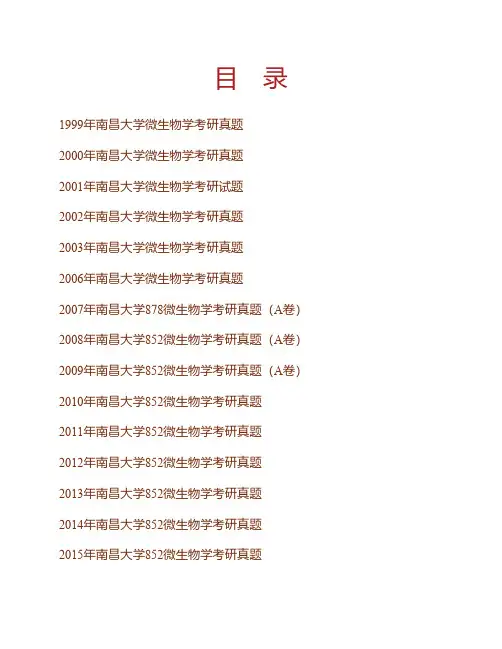
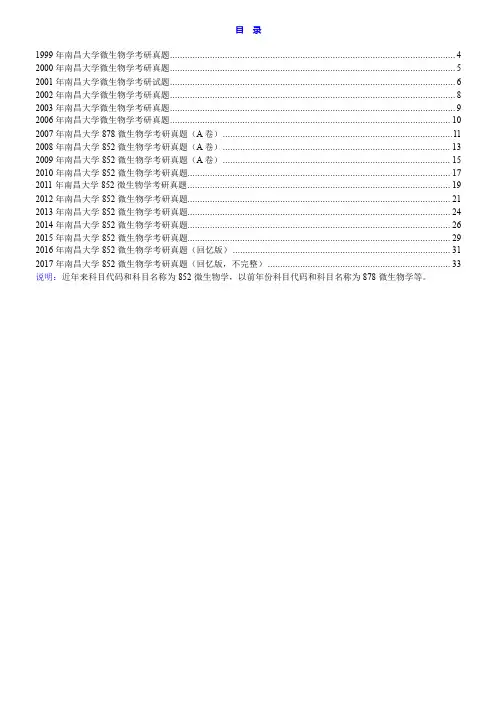
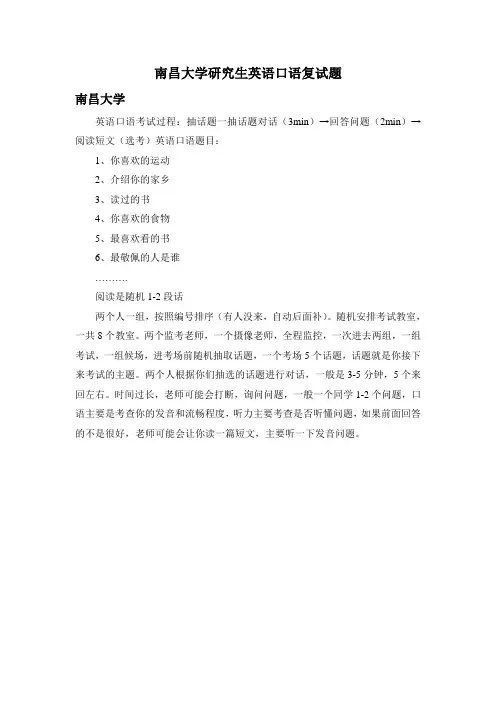
南昌大学研究生英语口语复试题
南昌大学
英语口语考试过程:抽话题一抽话题对话(3min)→回答问题(2min)→阅读短文(选考)英语口语题目:
1、你喜欢的运动
2、介绍你的家乡
3、读过的书
4、你喜欢的食物
5、最喜欢看的书
6、最敬佩的人是谁
……….
阅读是随机1-2段话
两个人一组,按照编号排序(有人没来,自动后面补)。
随机安排考试教室,一共8个教室。
两个监考老师,一个摄像老师,全程监控,一次进去两组,一组考试,一组候场,进考场前随机抽取话题,一个考场5个话题,话题就是你接下来考试的主题。
两个人根据你们抽选的话题进行对话,一般是3-5分钟,5个来回左右。
时间过长,老师可能会打断,询问问题,一般一个同学1-2个问题,口语主要是考查你的发音和流畅程度,听力主要考查是否听懂问题,如果前面回答的不是很好,老师可能会让你读一篇短文,主要听一下发音问题。
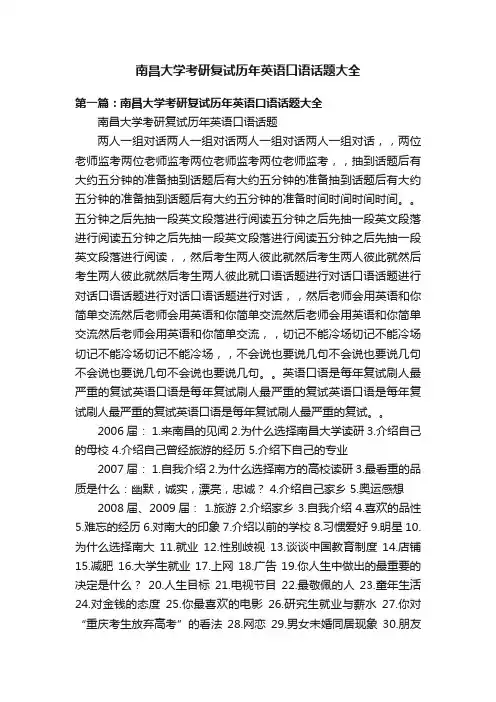
南昌大学考研复试历年英语口语话题大全第一篇:南昌大学考研复试历年英语口语话题大全南昌大学考研复试历年英语口语话题两人一组对话两人一组对话两人一组对话两人一组对话,,两位老师监考两位老师监考两位老师监考两位老师监考,,抽到话题后有大约五分钟的准备抽到话题后有大约五分钟的准备抽到话题后有大约五分钟的准备抽到话题后有大约五分钟的准备时间时间时间时间。
五分钟之后先抽一段英文段落进行阅读五分钟之后先抽一段英文段落进行阅读五分钟之后先抽一段英文段落进行阅读五分钟之后先抽一段英文段落进行阅读,,然后考生两人彼此就然后考生两人彼此就然后考生两人彼此就然后考生两人彼此就口语话题进行对话口语话题进行对话口语话题进行对话口语话题进行对话,,然后老师会用英语和你简单交流然后老师会用英语和你简单交流然后老师会用英语和你简单交流然后老师会用英语和你简单交流,,切记不能冷场切记不能冷场切记不能冷场切记不能冷场,,不会说也要说几句不会说也要说几句不会说也要说几句不会说也要说几句。
英语口语是每年复试刷人最严重的复试英语口语是每年复试刷人最严重的复试英语口语是每年复试刷人最严重的复试英语口语是每年复试刷人最严重的复试。
2006届: 1.来南昌的见闻 2.为什么选择南昌大学读研 3.介绍自己的母校 4.介绍自己曾经旅游的经历 5.介绍下自己的专业2007届: 1.自我介绍 2.为什么选择南方的高校读研 3.最看重的品质是什么:幽默,诚实,漂亮,忠诚? 4.介绍自己家乡 5.奥运感想2008届、2009届: 1.旅游 2.介绍家乡 3.自我介绍 4.喜欢的品性5.难忘的经历 6.对南大的印象 7.介绍以前的学校 8.习惯爱好 9.明星10.为什么选择南大11.就业12.性别歧视13.谈谈中国教育制度14.店铺15.减肥 16.大学生就业 17.上网 18.广告 19.你人生中做出的最重要的决定是什么?20.人生目标21.电视节目22.最敬佩的人23.童年生活24.对金钱的态度25.你最喜欢的电影26.研究生就业与薪水27.你对“重庆考生放弃高考”的看法28.网恋29.男女未婚同居现象30.朋友与友谊 31.现代生活的问题与烦恼 32.气候变化2010届:1.店铺2.对当下买房热的看法3.气候变化4.中国教育体制 5.大学生就业 6.未婚同居现象 7.世博会 8.犀利哥现象9.对谷歌事件的看法 10.减肥 11.校园恋爱 12.房地产 13.男女平等 14.上网 15.人生目标 16.广告 17.对“机会”的看法与态度 18.你最喜欢的天气 19.金融危机 20.现代生活的问题 21.对“小沈阳”的看法 22.网恋 23.喜欢的电影 24.喜欢的歌曲 25.介绍自己的家乡 26.研究生就业与薪水 27.对金钱的态度与看法 28.电视节目 29.朋友与友谊 30.生态问题 31.对网络流行语的看法32.童年生活33.旅游34.你人生中做出的最重要的决定?35.最敬佩的人 36.对当今“宅男宅女”现象的看2011届:1.网恋2.信息的重要性3.环境保护4.日本地震5.专业学习计划 6.邻居关系 7.电视节目 8.食物与做饭 9.计划生育政策 10.现代生活的问题11.对当今“宅男宅女”现象的看法12.你最喜欢的天气13.时尚 14.购物 15.电影 16.读书 17.介绍自己的家乡 18.网上购物 19.你喜欢的电影20.明星21.大学生就业22.研究生就业与薪水23.店铺24.你喜欢的歌曲 25.谈谈中国的教育制度 26.童年生活 27.你最敬佩的人 28.独生子女家庭的好坏 29.生态问题 30.朋友 31.男女未婚同居现象32.为什么选择南昌大学第二篇:考研复试常见英语口语话题考研复试常见英语口语话题关于个人方面常见的问题1.What kind of personalities do you think you have?2.What basic principles do you apply to you work?3.Do you think you are introverted or extroverted?4.What types of people don’t you like to work with?5.What do you think is the most important thing to you to be happy?6.Would you like to describe yourself as what kind of person you are?7.Would you like to tell me your weak points and strong points?8.What types of people do like to work with?9.Are you more a follower or a leader?10.What attitude do you take towards life?关于兴趣爱好常考的话题1.Do you have any special interests other than your job?2.What are your hobbies?3.What other interests do you have?4.What kind of recreations do you most enjoy?关于家庭的常见提问1.What’s your marital status?2.Could you tell me something about your family?3.Do you spend much time staying with your family?关于工作和经验的问题1.What is important to you in a job?2.Your resume says you have had some experience working in a foreign representative office in Shanghai, may I ask why you left?3.What qualifications do you have that make you feel you will be successful in your field?4.Please tell me your present job.5.What have you learned from the jobs you have had?6.What kind of jobs have you had?8.Please tell me about your working experience.9.Where do you want to be five years from now?10.What is your career objective?关于教育和学习经历的提问1.what is your major?2.Which university did you graduate from?3.What course did you like best?4.How did you get on with your studies in college?5.What subject did you major in at university?6.When did you graduate from university?其他相关的口语复试的问题1.What would you do if....?2.Why should we accept you?3.What qualities are needed to get a promotion in a company?4.What do you think is more important in getting a job, education background or experience?5.What qualities are the basic requirements for leading positions at all levels in a company?6.Why do some honest and loyal employees remain unprompted after many years of hard work?第三篇:考研复试英语口语材料2010考研复试英语口语面试(转载)一、复试中的口试要求1、评价标准:(1)语言准确性(语法和用词的准确性、语法结构的复杂性、词汇的丰富程度、发音的准确性)(2)话语的长短和连贯性(内容的连贯性、寻找合适词语而造成的停顿频率及长短、表达思想的语言长短等)(3)语言的灵活性和适合性(语言表达是否灵活、自然,话语是否得体,语言能否与语境、动能和目的相适应)2、口语测试一般包含如下两部分:第一部分:考查学生理解并回答有关日常生活、家庭、工作、学习等问题的能力(3--5分钟)。
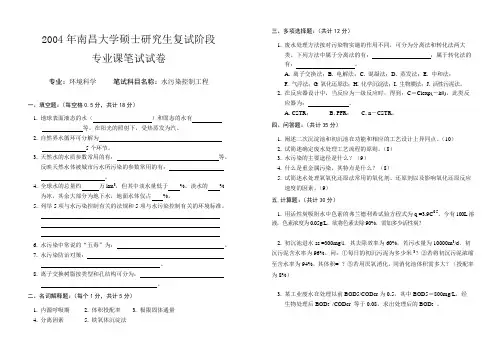
专业课笔试试卷专业:环境科学笔试科目名称:水污染控制工程一、填空题:(每空格0.5分,共计18分)1. 地球表面液态的水()和固态的水有等,在阳光的照射下,受热蒸发为汽。
2. 自然界水循环可分解为5个环节。
3. 天然水的水质参数常用的有:等。
反映天然水体被城市污水所污染的参数常用的有:。
4. 全球水的总量约万km3,但其中淡水量低于%。
淡水的%为冰,其余大部分为地下水,地面水体仅占%。
5. 列举5项与水污染控制有关的法规和5项与水污染控制有关的环境标准。
6. 水污染中常说的“五毒”为:。
7. 水污染防治对策:。
8. 离子交换树脂按类型和孔结构可分为:。
二、名词解释题:(每个1分,共计5分)1. 内源呼吸期2. 体积投配率3. 极限固体通量4. 分离因素5. 铁氧体沉淀法1. 废水处理方法按对污染物实施的作用不同,可分为分离法和转化法两大类。
下列方法中属于分离法的有:;属于转化法的有:。
A. 离子交换法;B. 电解法;C. 混凝法;D. 蒸发法;E. 中和法;F. 气浮法;G. 氧化还原法;H. 化学沉淀法;I. 生物膜法;J. 活性污泥法。
2. 在反应器设计中,当反应为一级反应时,得到:C=Ciexp(-kθ),此类反应器为:。
A. CSTR;B. PFR;C. n-CSTR。
四、问答题:(共计35分)1. 阐述二次沉淀池和初沉池在功能和相应的工艺设计上异同点。
(10)2. 试简述确定废水处理工艺流程的原则。
(8)3. 水污染的主要途径是什么?(9)4. 什么是重金属污染,其特点是什么?(8)5. 试简述水处理氧氧化还原法常用的氧化剂、还原剂以及影响氧化还原反应速度的因素。
(9)五.计算题:(共计30分)1. 用活性炭吸附水中色素的弗兰德利希试验方程式为q =3.9C0.5。
今有100L溶液,色素浓度为0.05g/L,欲将色素去除90%,需加多少活性炭?2. 初沉池进水ss =300mg/l,其去除效率为60%,若污水量为10000m3/d,初沉污泥含水率为96%。
2019 年吉林大学骨科学复试真题(一)简答题(5 分/道)1.消毒灭菌的方法2.血制品的分类3.术前对糖尿病人的评估和控制血糖4.烧伤严重程度的分级5.恶性肿瘤根据组织来源分类及命名(二)问答题(15 分/道)1.体液失调和酸碱失衡的常见类型和病因2.中心静脉压和补液之间的关系3.肠外营养制剂的组成成分4.脓毒血症的临床表现5.创伤的并发症2019 年上海交通大学骨科复试真题(一)名词解释1.肘管综合征2.病理性骨折3.Tinel 征4.Colles 骨折5.腰椎间盘突出(二)简答题1.肩关节脱位的分类及临床表现2.影响骨折愈合的因素3.骨折治疗原则4.脊柱的三柱理论5.股骨颈骨折的分类和临床表现6.骨肉瘤的临床表现和辅助检查的特点三、论述题1、断肢再植的手术原则(一)名词解释1.休克2.病理性骨折3.骨筋膜室综合征4.腰椎管狭窄5.关节脱位(二)简答题1.骨折的早期并发症2.骨关节炎的治疗3.股骨颈骨折的分类(三)论述题1.试述国际前沿技术在骨科中的应用2.骨质疏松和骨质软化的定义和 X 线区别3.良恶性骨肿瘤的鉴别4.影像学在临床应用的价值5.股骨头血供及对股骨颈骨折治疗和预后的意义(四)翻译1.中译英:影响骨折愈合因素的文章2.英译中:介绍骨质疏松 osteoporosis 的病因,可能机制的英文文章2019 年上海交通大学骨科复试真题(一)名词解释1.肘管综合征2.病理性骨折3.Tinel 征4.Colles 骨折5.腰椎间盘突出(二)简答题1.肩关节脱位的分类及临床表现2.影响骨折愈合的因素3.骨折治疗原则4.脊柱的三柱理论5.股骨颈骨折的分类和临床表现6.骨肉瘤的临床表现和辅助检查的特点三、论述题1、断肢再植的手术原则2019 年郑州大学骨科复试真题(专硕)英语、专业基础即病理、专业课即诊断加外科专业课(一)名词解释1.坏疽2.蜂窝织炎3.棒状小体(二)简答题1.癌和肉瘤的鉴别2.霍奇金淋巴瘤的分型外科(一)名词解释1.创伤2.二重感染3.肿瘤4.ARDS(二)简答题1.补钾原则2.输血适应症3.休克的表现及监测4.预防使用抗生素的指征诊断(一)名词解释1.kussmaul 呼吸2.发绀3.肝颈静脉回流征(二)简答题1.渗出液与漏出液的鉴别2.现病史的内容3.黄疸的鉴别4.二度房室传导阻滞的心电图表现2019 温州医科大学骨科学复试真题(一)名词解释1.AOSC2.Tinel 征3.LUTS4.Eisenmenger 综合征5.交通性脑积水(二)简答论述1.急性阑尾炎的临床诊断2.转子间骨折的 Evans 骨折分型3.简述膀胱肿瘤的 TMN 分期中 T 分期4.Pancoast 瘤的临床表现5.简述垂体腺瘤的按照内分泌功能分型6.胫骨平台骨折 Schatzker 分型2019 温州医科大学骨科复试真题(一)名词解释1.calot 三角2.应力性骨折3.肾自截4.体外循环5.创伤性窒息(二)简答论述1.急性胰腺炎非手术治疗2.骨肿瘤的临床表现3.尿三杯试验及意义4.急性脓胸的治疗原则5.蛛网膜下腔出血常见原因2019 年广州医科大学附属第一医院骨科专硕复试真题(一)简答题1.Codman 三角2.Colles 骨折3.慢性血源性骨髓炎的病理特点4.托马斯征5.颈椎病分型(二)论述题1.腰椎间盘突出神经根痛的机制2.骨肿瘤外科分期。
2005设计学611简答题1简述在设计中怎样合理地考虑人的因素。
2简述在设计中怎样合理地考虑技术的因素3设计中怎样把握比例和尺度的关系。
4简述设计创造市场的含义。
分析题1试举一具体设计实例分析实用功能,认知功能和审美功能在设计中是怎样考虑的。
2如何理解设计风格形式是一个设计师成熟的重要标志。
举例说明。
获取手绘真题、作品搜索南昌80壹艺术2006设计学611问答题1为什么说设计文化的基本表现形态是人类的生活方式?2为什么说一种新材料的诞生往往会给设计造成重大影响?3设计师的社会职责在设计中怎样体现4儒家孔子主张文质兼备,在设计在现代设计中是怎样考虑的?分析题1简述设计与消费的关系。
2论述老子有之以为利,无之以为用的思想对现代设计艺术的影响和启迪。
获取手绘真题、作品搜索南昌80壹艺术简答题1怎样理解以生存为目的的设计活动先于以精神为目的的艺术活动2从构成世界的三大要素自然 -人--社会来论述产品设计,视觉传达设计及环境设计与三大要素间的关系。
3为什么说设计是创造商品高附加值的方法。
4为什么说设计批评的标准随历史而演化。
5为什么说分析或回答设计与社会的关系问题要借助结构主义理论分析题1论述庄子天人合一的思想与现代可持续发展设计思想的关联及启示。
2举例分析设计与消费的关系。
2008设计学611简答题1为什么说工业设计是将科学技术和文化艺术相结合的一门边缘学科2为什么说设计是最终实现是以满足人的精神和物质要求为目的的3设计师的社会责任是如何体现的4设计的审美价值是如何体现的5为什么市场营销要以产品生命周期的理论为中心来探讨。
分析题1以一款你熟悉的设计对象为例,具体分析它应遵从的设计程序。
2试分析设计的经济性性质体现在哪几个方面?获取手绘真题、作品搜索南昌80壹艺术简答题1为什么说设计批评要重视人为精神2为什么说人类设计文化的理解体现出自然价值观的最重要意义是模仿自然3为什么说设计时代意味着附加值的时代4为什么说艺术推动设计。
2013年南昌大学考研真题一、计算(填空)1、求∫302t -)(σ)2-(σe -dt t k t 的值。
2、求函数f (t )=cos 0w (t-0t )的单边拉氏变换。
3、求t jw e 0/t 的拉氏变换。
4、已知X (z )=5z/(7z-32z -2),求X (n )。
5、已知F(w)=u(-w),求f (t )。
6、已知X (n )=n n )31(u(n),求X(z)。
7、F (z )=1+1/z+6/2z +4/3z ,单位序列表示,则f (n )=8、H (z )=(z+1)/(z-1)表示()滤波器9、f (t )的最大截止频率100Hz ,求f(3t)的最小取样频率二、计算1、已知f(t)对应的傅里叶为1F (w ),则∫∞-)]1-τ(2[t d f τ的傅立叶变换为?2、已知f (t )的拉氏变换是)1(42-+s s e s,求f (t )。
3、已知X (n )=u(n)-u(n-5),h(n)=n)21(u(n),求y(n)=X(n)*h(n)。
4、X(z)=)2-1)(-1(11-1-2-1-z z z z ++,求X (0),X (∞)的值。
三、求(1)列写状态方程(2)求H (s ),系统是否稳定(3)列写系统微分方程(4)e(t)=u(t)对应r(t)=(t t e e 3--65-2131+)u(t),求)0(),0(),(-'-r r t y zi四、零点1z =0,极点20y ,31)(lim ,1,21-∞→21====)(初值n h p p n ,y (1)=1 求(1)H (z )及)(t y zi (2)当x (n )=)(时,求t y )()3-(zs n u n 五、如图所示,理想低通滤波器的转移函数为Ω)]Ω2-(-)Ω2([)(0-0>>+=w e w u w u w H jwt i 且(1)求框内所示系统的单位冲激响应和h (t )。
南昌大学社工考研复试真题南昌大学社工考研复试真题南昌大学社工考研复试是每个社工专业学生都非常重视的一项考试。
这个考试不仅对于我们的学习成果进行了一次全面的检验,更是对我们未来职业发展的重要指引。
在这篇文章中,我将分享一些南昌大学社工考研复试的真题和一些备考经验。
一、专业基础知识南昌大学社工考研复试中,专业基础知识是必不可少的一部分。
在这个环节中,考官会通过提问来考察我们对社会工作理论和实践的理解和掌握程度。
例如,他们可能会问到社会工作的定义、社会工作的核心价值观、社会工作的方法和技巧等等。
因此,在备考过程中,我们需要对社会工作的相关理论进行深入的研究和学习,掌握相关概念和理论框架,以便能够在考试中对问题做出准确的回答。
二、案例分析与解决问题能力除了专业基础知识,南昌大学社工考研复试还会考察我们的案例分析和解决问题能力。
在这个环节中,考官会给出一个具体的社会工作案例,要求我们分析问题的原因、制定解决方案,并对方案的可行性进行评估。
这种题型旨在考察我们的逻辑思维能力、问题解决能力和创新思维能力。
因此,在备考过程中,我们需要不断练习案例分析和解决问题的能力,多读一些社会工作实践案例,培养自己的分析思维和解决问题的能力。
三、个人陈述与面试技巧在南昌大学社工考研复试中,个人陈述和面试环节也是非常重要的。
个人陈述是一个展示自己综合素质和职业发展规划的机会。
在陈述中,我们需要清晰地表达自己的学术背景、研究兴趣和未来职业目标。
同时,我们还需要展示自己的团队合作能力、沟通能力和领导能力。
在面试环节中,我们需要做到自信、冷静和机智应对考官的问题。
因此,在备考过程中,我们需要提前准备个人陈述,反复练习并且和他人进行模拟面试,以提高自己的表达和应变能力。
四、心态调整和综合素质的培养最后,南昌大学社工考研复试中,心态调整和综合素质的培养也是非常重要的。
考试的过程中,我们不能只关注分数和结果,而是要注重学习过程和自身的成长。
南昌大学法律硕士(非法学)复试真题一、南昌大学复试概况1.2020年录取情况(1)录取分数线年份法律硕士(非法学)法律硕士(法学)20203604646696934146466969 20193204444666632044446666 20183154242636331542426363(2)录取人数年份法律硕士(非法学)全日制非全日制法律硕士(法学)全日制非全日制2020806709 20198086814 2018651880182.复试方式和考察范围(1)复试方式:专业课笔试、专业课面试、英语面试(2)复试内容:专业课笔试:包括刑事诉讼法,2.5小时,满分100分。
专业课面试:包括自我介绍,任选刑法、民法、法理学、宪法、法制史其中一门的话题讨论,再有老师提问,20分钟左右,满分100分。
英语面试:包括小组对话和文章朗读,两两一组,任意选择当年比较热门的五个话题,由考生随机抽取讨论后老师提问并朗读一段英文,5分钟左右满分50分。
(3)复试成绩:笔试满分100分、面试满分100分、英语面试50分。
专业笔试和面试合格线60分,英语面试及格分30分,任一科不及格者不予录取。
(4)最终成绩:(初试成绩/初试总分)×60+(复试成绩/250)×40(5)录取:录取时,分二级学科方向按考生入学考试总成绩排序,依次录取。
(6)调剂:2020年不接受调剂(7)学费标准:法硕(非法学)(全日制),3年,1万/学年法硕(法学)(全日制),2年,1.2万/学年法硕(非法学)(非全日制),3年,1万/学年法硕(法学)(非全日制),3年,1万/学年3.笔试内容刑事诉讼法,参考书目:刑事诉讼法学,陈卫东、孙长永主编,高等教育出版社2017年版本。
相关法律,法规及司法解释。
4.面试内容(1)专业课口试:简答自我介绍,从初试五科中自选一个,每科下设几个选题题号,谈一谈。
(2)英语口试:小组讨论和文章朗读,按照报学号的顺序,相邻两个人一组抽选一个话题,自行展开对话,每人4-6句阐述自己对话题的理解,再由老师问2-3个问题,最后读一段英文,一张全英文小纸条,流利朗读即可,无需翻译,同一场考口语的,一般用一套话题纸条。